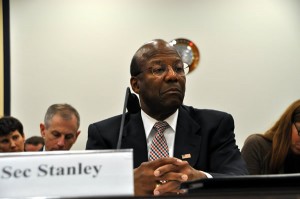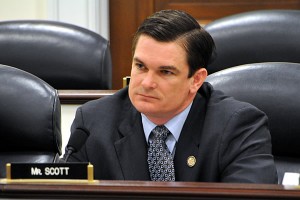National
‘Don’t Ask’ repeal could be certified mid-summer
Pentagon officials testify on ending military’s gay ban

Top Pentagon officials said Friday that “Don’t Ask, Don’t Tell” repeal training could sufficiently be complete by mid-summer to allow for certification to end to the law at that time during a congressional hearing in which GOP lawmakers expressed discontent with moving toward open service.
In a hearing before the House Armed Services personnel subcommittee, Undersecretary of Defense for Personnel & Readiness Clifford Stanley and Director of the Joint Staff Vice Adm. William Gourtney said implementation for “Don’t Ask, Don’t Tell” repeal is proceeding on track and troops are being trained to handle open service.
Stanley told the Republican-controlled panel that training could be sufficiently finished by mid-summer to allow for certification for repeal.
“We’re looking at mid-summer” to move towards certification, Stanley said, adding that this target time could be delayed if something disruptive emerges that Pentagon leaders don’t anticipate.
According to Stanley, the U.S. military has trained more than 200,000 members of the armed forces on handling open service, or about nine percent of the armed forces.
Gourtney concurred that mid-summer is the time for when certification for repeal is expected to happen.
“It’s really the magnitude of the challenge that’s out there and making sure that as we get our arms around the magnitude of the challenge, we don’t miss anything,” Gourtney said. “So we’re grateful for the deliberate process that has been laid out and we’re [looking at] mid-summer for the recommendation. Followed by 60 days after that, repeal is achievable.”
In December, President Obama signed legislation allowing for repeal of “Don’t Ask, Don’t Tell,” but the anti-gay law will only be off the books after 60 days pass following certification from the president, the defense secretary, and the chair of the Joint Chiefs of Staff. Gay service members are still in danger of discharge from the armed services until the certification process is complete.
The military services are progressing with three tiers of training to prepare troops for “Don’t Ask, Don’t Tell.” The Pentagon previously established in its repeal implementation plan that the completion of Tier 2 training — or the training of leadership of troops within a service — could be the time when certification could happen.
According to Stanley’s written testimony before the committee, Tier 2 training for the Navy is set to end on April 30, for the Air Force on May 1 and for the Coast Guard on May 15. For the Army, Tier 2 training is set for completion for its active component on July 15 and its reserve component on August 15. The Tier 2 training for the Marine Corps was already set for completion on March 15.
Goutney said the time for issuing repeal certification is dependent on when the Army completes its training for “Don’t Ask, Don’t Tell.” The admiral said instruction for the Army is expected to be complete at a later time because the service is larger than others.
Following the hearing, Aubrey Sarvis, executive director of the Servicemembers Legal Defense Network, told the Washington Blade he believed training for “Don’t Ask, Don’t Tell” could be accelerated and should be concluded by May 1.
“There’s no reason why it should take the better part of this year to get to open service,” Sarvis said. “So, if we don’t have certification until mid-July or August, then we’re talking about October or November before we get there. I don’t think that’s what the majority of members of voted for repeal had in mind.”
The subcommittee testimony from Stanley and Gourtney was expected to precede a hearing the full House Armed Services Committee on April 7. Josh Holly, a committee spokesperson, told the Blade each of the military service chiefs are slated to testify on “Don’t Ask, Don’t Tell” repeal on that date.
As Stanley and Gourtney provided an update on “Don’t Ask, Don’t Tell” repeal implementation efforts, they fielded questions from Republican subcommittee members who were hostile to moving torward open service.
Rep. Joe Wilson (R-S.C.), chair of the subcommittee, expressed displeasure with the pace at which the Democratic-controlled Congress last year moved forward with repeal legislation during the lame duck session of Congress.
“I felt the repeal was rushed through without adequate review and consideration of the extent of the full implications of repeal,” Wilson said. “I believe the lame duck session was undemocratic and that dozens of defeated congress members adopted a law with significant consequences, but it failed to even pass a budget. It was a violation of the principles of representative democracy.”
In response, Sarvis blasted Wilson for suggesting that Congress improperly moved forward with “Don’t Ask, Don’t Tell” repeal last year.
“Mr. Wilson knows better,” Sarvis said. “There was nothing undemocratic about last year’s vote to repeal ‘Don’t Ask, Don’t Tell.’ The measure passed both houses of Congress on a strong bi-partisan vote.”
Rep. Mike Coffman (R-Colo.), a veteran of the Army and Marine Corps, was particularly critical of the Pentagon report favoring open service that came out before Congress repealed the law and said he had “no confidence in the process” for implementing open service.
“I think that this survey and study was a conclusion looking for a study,” he said. “This is a political decision made by the executive branch and the military will follow it under whatever circumstances or ramifications it has to the combat effectiveness of our forces.”
Some of the more pointed criticism of “Don’t Ask, Don’t Tell” came from freshmen GOP lawmakers who were elected to office in 2010 during the Republican wave and weren’t present for the vote last year on ending the military’s gay ban.
Rep. Allen West (R-Fla.), an Army veteran of the first Persian Gulf War, said allowing open gays to serve in the armed forces is, in effect, forming “the military to a behavior.”
“I remember going through the military, we took behaviors and we formed it to the military,” West said. “Using a term that they have over in the Middle East, I’m just very wary of the fact that this could be the camel getting his nose under the tent.”
West also invoked the 2009 Foot Hood shootings in which Nidal Hasan, a U.S. Army major serving as a psychiatrist, was charged with killing people 13 with a firearm and wounding 29 others. Hasan is an American-born Muslim of Palestinian descent, and questions have emerged over whether pressures over his religion prompted the incident.
“We had commanders up here at Walter Reed that saw some very disturbing behaviors there with Maj. Nidal Hasan, but for whatever reasons — I think one of the main reasons is the retribution of an atmosphere of political correctness — they did not speak out about that,” West said. “Of course, we know what happened when he was transferred down to Foot Hood, Texas.”
R. Clarke Cooper, executive director of the Log Cabin Republicans, said he’s offended West would suggest “political correctness would trump military order and discipline” in addition to the lawmaker’s comparison of the service of gay troops to the Fort Hood assault.
“Congressman West’s remarks were an unnecessary and unfortunate distraction from the valuable report by the repeal implementation team,” Cooper said.
Questioning backfired on one freshman Republican who apparently was attempting to demonstrate that gay troops have been discharged not for identifying as gay, but for violating the military’s code of conduct.
Rep. Austin Scott (R-Ga.) asked Gourtney whether as a Navy officer he had discharged anyone from service because of sexual orientation. Gourtney admitted that he had in either 1994 to 1995.
“We had an incident shortly after ‘Don’t Ask, Don’t Tell’ passed that a young sailor came forward through his chaplain, through our chaplain, that he was gay, and we discharged him from the service,” Gourtney said.
When Scott pressed on whether this sailor was discharged because he was gay or because he violated a standard of conduct, Gourtney replied that it was because of the sailor’s gay identity and not for any other violation, much to the surprise of Scott.
“That’s not the answer I thought you would give,” Scott said, eliciting laughter from those who were in attendance at the hearing.
Gourtney added that there are cases in which standards of conduct have been violated as part of separations under “Don’t Ask, Don’t Tell,” but said these incidences are few in number.
Additionally, Scott asked about the cost of implementing “Don’t Ask, Don’t Tell.” Stanley replied the cost of training material has been about $10,000 — considerably a low number for government spending.
But Scott expressed skepticism about the estimate and requested further information.
“If something was done at the [Defense Department] for $10,000, I’d like to know what it was,” Scott said. “I haven’t seen anything out of there with a price-tag that low.”
Rep. Vicky Hartlzer (R-Mo.), another freshman Republican, noted that men and women aren’t permitted to bunk or shower to together in the armed forces and questioned why the military would ask straight troops to shower with gay service members.
In response, Gourtney said the rationale is based on the difference between gender and sexual orientation.
“Gender is very public and sexual preference is very private,” Gourtney said. “We’re not asking about their sexual preference.”
But Gourtney’s answer apparently didn’t allay Hartlzer, who said the military isn’t “being consistent” with its policy.
“I’m very concerned that in a time of war in our country — we have men and women in harm’s way — that we are making such a radical, major shift in our policy,” she said.
Hartlzer isn’t a stranger to taking anti-gay positions. Last month, she introduced a House resolution condemning President Obama for dropping defense of the Defense of Marriage Act against litigation in court.
Democrats who voted in favor of “Don’t Ask, Don’t Tell” repeal defended the decision of Congress to end the statute last year and said the focus of the 112th Congress should be moving toward that goal.
Rep. Susan Davis (D-Calif.), ranking Democrat on the subcommittee, said discussion should move away from whether open service should be implemented and Congress should instead focus on proper oversight of “Don’t Ask, Don’t Tell” repeal.
“I think the debate is no longer really on whether or not to allow gay, lesbian and bisexual American from serving in uniform,” Davis said. “The issue that we are here to focus on today is how the services and the department are preparing — and informing leadership — on how the policies and regulations that are being considered have an impact on military readiness, military effectiveness, unit cohesion and recruiting and retention of the armed forces.”
Rep. Chellie Pingree (D-Maine) said “Don’t Ask, Don’t Tell” repeal was a change that Congress needed last year to enact because the anti-gay law is “morally reprehensible policy.”
“I just think that it violated the fundamental value of fairness and equal treatment that we cherish in this country, and I’m just so pleased that we’re here to talk about the end to it and the transition out of it, which, I think, is great,” she said.
Following Scott’s question on the cost of implementing repeal, Pingree said the $10,000 number is infinitesimal compared to the $193.3 million estimate offered by the Government Accountability Office in January on the cost of “Don’t Ask, Don’t Tell” from fiscal years 2004 to 2009.
“It’s not only unconscionable that these people were willing to serve their country and came forward, or were asked to leave, but the costs are horrendous,” she said.
Despite the qualms of Republican subcommittee members, LGBT advocates dismissed the possibility that Congress could at this point delay or derail the end to the military’s gay ban. Rep. Duncan Hunter (R-Calif.) has introduced legislation that would expand the certification requirement to include input from each of the service chiefs, which, if enacted into law, could disrupt the repeal process.
Davis told the Blade she doesn’t think Congress has a chance of interfering with “Don’t Ask, Don’t Tell” now that legislation has already passed a measure that would repeal the statute.
“I think there are people that would love to slow down the process, but actually I think it’s proceeding fairly well and I don’t know that that would be necessary,” she said.
Sarvis said the ability of the opponents of “Don’t Ask, Don’t Tell” repeal in Congress to thwart open service at this time is “highly unlikely.”
“Obviously, there are a few members who would like to delay or derail, but I don’t think that’s where a majority are,” Sarvis said.
U.S. Supreme Court
Supreme Court to consider bans on trans athletes in school sports
27 states have passed laws limiting participation in athletics programs

The U.S. Supreme Court on Thursday agreed to hear two cases involving transgender youth challenging bans prohibiting them from participating in school sports.
In Little v. Hecox, plaintiffs represented by the ACLU, Legal Voice, and the law firm Cooley are challenging Idaho’s 2020 ban, which requires sex testing to adjudicate questions of an athlete’s eligibility.
The 9th U.S. Circuit Court of Appeals described the process in a 2023 decision halting the policy’s enforcement pending an outcome in the litigation. The “sex dispute verification process, whereby any individual can ‘dispute’ the sex of any female student athlete in the state of Idaho,” the court wrote, would “require her to undergo intrusive medical procedures to verify her sex, including gynecological exams.”
In West Virginia v. B.P.J., Lambda Legal, the ACLU, the ACLU of West Virginia, and Cooley are representing a trans middle school student challenging the Mountain State’s 2021 ban on trans athletes.
The plaintiff was participating in cross country when the law was passed, taking puberty blockers that would have significantly reduced the chances that she could have a physiological advantage over cisgender peers.
“Like any other educational program, school athletic programs should be accessible for everyone regardless of their sex or transgender status,” said Joshua Block, senior counsel for the ACLU’s LGBTQ and HIV Project. “Trans kids play sports for the same reasons their peers do — to learn perseverance, dedication, teamwork, and to simply have fun with their friends,” Block said.
He added, “Categorically excluding kids from school sports just because they are transgender will only make our schools less safe and more hurtful places for all youth. We believe the lower courts were right to block these discriminatory laws, and we will continue to defend the freedom of all kids to play.”
“Our client just wants to play sports with her friends and peers,” said Lambda Legal Senior Counsel Tara Borelli. “Everyone understands the value of participating in team athletics, for fitness, leadership, socialization, and myriad other benefits.”
Borelli continued, “The U.S. Court of Appeals for the Fourth Circuit last April issued a thoughtful and thorough ruling allowing B.P.J. to continue participating in track events. That well-reasoned decision should stand the test of time, and we stand ready to defend it.”
Shortly after taking control of both legislative chambers, Republican members of Congress tried — unsuccessfully — to pass a national ban like those now enforced in 27 states since 2020.
Federal Government
UPenn erases Lia Thomas’s records as part of settlement with White House
University agreed to ban trans women from women’s sports teams

In a settlement with the Trump-Vance administration announced on Tuesday, the University of Pennsylvania will ban transgender athletes from competing and erase swimming records set by transgender former student Lia Thomas.
The U.S. Department of Education’s Office for Civil Rights found the university in violation of Title IX, the federal rights law barring sex based discrimination in educational institutions, by “permitting males to compete in women’s intercollegiate athletics and to occupy women-only intimate facilities.”
The statement issued by University of Pennsylvania President J. Larry Jameson highlighted how the law’s interpretation was changed substantially under President Donald Trump’s second term.
“The Department of Education OCR investigated the participation of one transgender athlete on the women’s swimming team three years ago, during the 2021-2022 swim season,” he wrote. “At that time, Penn was in compliance with NCAA eligibility rules and Title IX as then interpreted.”
Jameson continued, “Penn has always followed — and continues to follow — Title IX and the applicable policy of the NCAA regarding transgender athletes. NCAA eligibility rules changed in February 2025 with Executive Orders 14168 and 14201 and Penn will continue to adhere to these new rules.”
Writing that “we acknowledge that some student-athletes were disadvantaged by these rules” in place while Thomas was allowed to compete, the university president added, “We recognize this and will apologize to those who experienced a competitive disadvantage or experienced anxiety because of the policies in effect at the time.”
“Today’s resolution agreement with UPenn is yet another example of the Trump effect in action,” Education Secretary Linda McMahon said in a statement. “Thanks to the leadership of President Trump, UPenn has agreed both to apologize for its past Title IX violations and to ensure that women’s sports are protected at the university for future generations of female athletes.”
Under former President Joe Biden, the department’s Office of Civil Rights sought to protect against anti-LGBTQ discrimination in education, bringing investigations and enforcement actions in cases where school officials might, for example, require trans students to use restrooms and facilities consistent with their birth sex or fail to respond to peer harassment over their gender identity.
Much of the legal reasoning behind the Biden-Harris administration’s positions extended from the 2020 U.S. Supreme Court case Bostock v. Clayton County, which found that sex-based discrimination includes that which is based on sexual orientation or gender identity under Title VII rules covering employment practices.
The Trump-Vance administration last week put the state of California on notice that its trans athlete policies were, or once were, in violation of Title IX, which comes amid the ongoing battle with Maine over the same issue.
New York
Two teens shot steps from Stonewall Inn after NYC Pride parade
One of the victims remains in critical condition

On Sunday night, following the annual NYC Pride March, two girls were shot in Sheridan Square, feet away from the historic Stonewall Inn.
According to an NYPD report, the two girls, aged 16 and 17, were shot around 10:15 p.m. as Pride festivities began to wind down. The 16-year-old was struck in the head and, according to police sources, is said to be in critical condition, while the 17-year-old was said to be in stable condition.
The Washington Blade confirmed with the NYPD the details from the police reports and learned no arrests had been made as of noon Monday.
The shooting took place in the Greenwich Village neighborhood of Manhattan, mere feet away from the most famous gay bar in the city — if not the world — the Stonewall Inn. Earlier that day, hundreds of thousands of people marched down Christopher Street to celebrate 55 years of LGBTQ people standing up for their rights.
In June 1969, after police raided the Stonewall Inn, members of the LGBTQ community pushed back, sparking what became known as the Stonewall riots. Over the course of two days, LGBTQ New Yorkers protested the discriminatory policing of queer spaces across the city and mobilized to speak out — and throw bottles if need be — at officers attempting to suppress their existence.
The following year, LGBTQ people returned to the Stonewall Inn and marched through the same streets where queer New Yorkers had been arrested, marking the first “Gay Pride March” in history and declaring that LGBTQ people were not going anywhere.
New York State Assemblywoman Deborah Glick, whose district includes Greenwich Village, took to social media to comment on the shooting.
“After decades of peaceful Pride celebrations — this year gun fire and two people shot near the Stonewall Inn is a reminder that gun violence is everywhere,” the lesbian lawmaker said on X. “Guns are a problem despite the NRA BS.”
-

 U.S. Supreme Court3 days ago
U.S. Supreme Court3 days agoSupreme Court to consider bans on trans athletes in school sports
-

 Out & About3 days ago
Out & About3 days agoCelebrate the Fourth of July the gay way!
-

 Virginia3 days ago
Virginia3 days agoVa. court allows conversion therapy despite law banning it
-

 Maryland5 days ago
Maryland5 days agoLGBTQ suicide prevention hotline option is going away. Here’s where else to go in Md.














